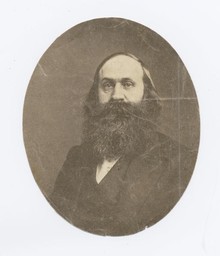Booth, Sherman Miller 1812 - 1904

temperance lecturer, abolitionist, editor, b. Davenport, Delaware County, N.Y. He attended the district school and Jefferson Academy and for several years alternated school teaching with farming. In the spring of 1837 he became a full-time temperance lecturer in New York State, then attended Yale Univ., graduating in 1841. While in college he helped organize the Liberty party in New Haven and after graduation became state agent in Connecticut for the party. In 1842 he moved to Meriden, Conn., where he associated with Ichabod Codding (q.v.) in editing the Christian Freeman. In May, 1848, he followed Codding to Wisconsin, where he took charge of the American Freeman, a Liberty party paper which had just been moved from Waukesha to Milwaukee. He soon became proprietor, renamed the paper the Wisconsin Freeman, and later, the Free Democrat, under which title he published it until 1859. In the abolitionists' contests with better-established political parties for power in Wisconsin, Booth took a leading part. He was secretary of the convention at Buffalo, New York, in 1848 which formed the Free Soil party and campaigned for the party in Wisconsin that year. In 1851 he helped break Democratic control for two years by pursuading the Whig, L. J. Farwell (q.v.) to run for the governorship, and was an organizer of the Republican party in 1854. That year the Glover incident afforded Booth the chance to achieve popular renown. Learning that Joshua Glover, a runaway slave, had been captured by his Missouri owner and jailed in Milwaukee under the authority of the Fugitive Slave Act of 1850, Booth rode his horse through the city streets, scattering hand-bills summoning a citizens' meeting and allegedly shouting, "Freemen to the rescue." A mob soon broke into the jail and rescued Glover, who was later spirited off to Canada. The affair placed Booth in the center of a six-year controversy between state and federal authorities that eventually reached the U.S. Supreme Court. Before quiet was restored, the Wisconsin Supreme Court deliberately set itself against the federal government, and the legislature in a series of resolutions denounced the federal court's "arbitrary act of power" in its adverse decision on the Booth case as "void and of no force." Finally, the day before Buchanan relinquished the presidency to Lincoln, he pardoned Booth. In the ensuing Civil War, Booth campaigned vigorously for the Union cause on the lecture platform and in the Daily Life, which he founded in 1861. In 1865 the newspaper merged with the Evening Wisconsin, Booth serving as associate editor until 1866. He moved to Chicago in 1868 to manage the Wisconsin Cooperative Newspaper Association office there and died in that city. He was married three times, to Margaret Tufts, who died in 1849; to Mary Corss, a poet, who died in 1865, and to Augusta Smith, who survived him. Ada T. Griswold, comp., Annotated Catalogue of Newspaper Files in . . . State Hist. Soc. of Wis. (Madison, 1911); A. J. Beitzinger, "Federal Law Enforcement and the Booth Cases," in Marquette Law Review, 41:7-32; A. M. Thomson, A Political Hist. of Wis. (Milwaukee, 1900), Milwaukee Evening Wis., Au-gust 11, 12, 1904; Sherman M. Booth, "Reminiscences of Early Struggles in Wisconsin Politics and Press," in Wis. Press Assoc. Proceedings, 44:105-119; biographical and family history, in the McCormick Collection, State Hist. Soc. of Wis.
The Wisconsin Historical Society has manuscripts related to this topic. See the catalog description of the Sherman M. Booth Family Papers for details.
View a related article at Wisconsin Magazine of History Archives.
View newspaper clippings at Wisconsin Local History and Biography Articles.
Learn More
Dictionary of Wisconsin History
Explore more than 1,600 people, places and events in Wisconsin history.
[Source: Dictionary of Wisconsin biography]
